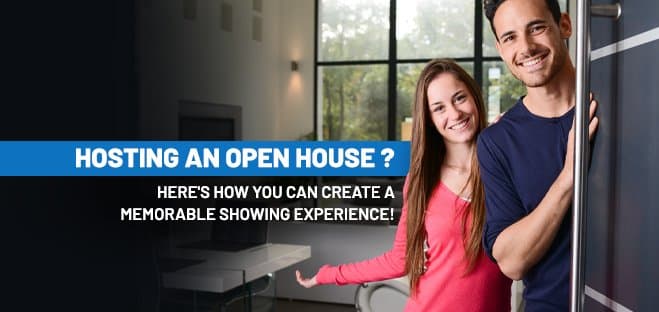Blog Search
Tips for Hosting a Successful Open House

Every property seller knows that the key to selling a home fast is an excellent first impression, which is why a house showing is so important. A compelling home showing can make a significant difference in the potential buyer’s perception of the property and, ultimately, lead to a faster sale at a desirable price.
As a property seller, you only have three options for showing your house to potential buyers.
A lockbox showing, done by real estate agents, lasts only about 30 minutes."
A private showing, done only for a few selected buyers considered severe and will only last a few hours.
An Open house, which makes your property open to potential buyers of a wide variety over a long-fixed period, usually the weekends.
Open houses are often favoured to showcase and market a home because of their initial filtering effect. The other two options require you to present your home to potential buyers, which can be time-consuming and potentially fruitless if they end up not liking what they see. Conversely, holding an open house is a great way to weed out potential buyers who aren’t serious, allowing you to skip right to the bid and negotiation phase.
That said, there is much more to open houses than just opening the front door for visitors. It is a process to bring out the best of your property to potential buyers at the end of the day. This means it comes with guidelines of do’s and don’ts that you must know to get the most out of it.
THE PROCESS
The entire open housing process can be categorized into three phases. Each phase focuses on a unique aspect of the process and tackles the challenges and opportunities that arise at that stage.

01Preparations
This phase begins with a discussion between the agent and the seller to determine the best date and time for the event. This phase also involves deciding on effective advertising strategies to attract maximum attention to the property. To make the property more appealing to buyers, the seller or agent must prepare it for showcasing. This can include purchasing refreshments, printing flyers, and setting up signs. Additionally, small touches can be added to create a warm and welcoming ambience. It’s also essential to decide on specific conditions for buyers visiting the home, such as removing shoes or taking photographs, which can be discussed and established during this phase.
02Marketing
This is the phase in which the agent lists your property on the local MLS and immediately starts putting those flyers and print ads to use. This is a crucial phase, as depending on how well you do this could determine how successful your open house will be. So make sure to go all out, meaning get the word around through friends and family and put it up on social media and online real estate portals to reach a wider audience.
03Execution
This is the day when all those stressful all-night planning finally comes into motion. As the seller, you cannot do much in this phase except to ensure the visitors have a good time and find no reason to lose their smile. So make sure to give them a pleasant greeting and be on your toes to answer any questions immediately. In most cases, particularly in quick-moving real estate markets, once a buyer expresses interest in the property, they will get in touch with their agent to set up a private showing or submit an offer right away.

THE DO’S
01De-clutter your home
Put yourself in the home buyer’s shoes for a second and imagine yourself taking a tour of the house. Pretend that you happened upon this room which is riddled with random objects everywhere, posters on the wall and dust all around. Can you imagine yourself living there? Most probably not, and even if you could, it won’t feel very nice. That is precisely how the potential home buyers would feel and what makes it essential to de-clutter everything. If you cannot remove all your belongings to a different location, consider boxing them up and storing them in a separate storage room that is not likely to be seen or accessed by potential buyers.
02Prepare your agent to answer all questions
There is no version of an open house in which the buyers won’t have any questions about the property, its neighbourhood, or its history. Therefore, it’s crucial to provide your agent with all the necessary information beforehand so that they can effectively address any questions that may arise. Make sure to disclose everything, good or bad, because the buyers have a right to know, and it can prevent any legal issues down the line.
03Promote the neighborhood, not just the house
This point goes hand-in-hand with the last one: an open house is not just an opportunity for buyers to explore the place but also the neighbourhood. This presents a unique opportunity for you to showcase the house more engagingly. Home buyers like to envision themselves living in the house before making a decision. By highlighting the benefits of the surrounding schools or an easy commute, you can help potential buyers form a more vivid image of them living in the space.
04Engage all 5 senses - smell, sight, taste, touch, and sound
When hosting an open house, creating an immersive and memorable experience for potential buyers is important. One way to achieve this is by engaging all five senses - smell, sight, taste, touch, and sound. Consider lighting a few candles or diffusing essential oils for the fragrance to create a pleasant and inviting scent. Ensure the space is well-lit to highlight the home’s features and create a welcoming atmosphere.
Offering refreshments like cookies or fruit-infused water can engage the sense of taste and make the space feel more inviting. Additionally, consider placing soft blankets or pillows on furniture to engage the sense of touch and create a cosy atmosphere.
Finally, playing soft background music or the gentle sound of a water feature can engage the sense of sound and create a peaceful ambience. By engaging all five senses, you can create a truly immersive experience that potential buyers will remember and associate with the home.
THE DON’TS
01Pets not allowed
An open house, by all means, is a controlled environment, and it falls on the shoulders of the host to keep it that way. You want to keep the buyers’ tour of the house uninterrupted and pleasant. Having your pets roam the premise freely is a surefire way to ensure the opposite. If you factor in the possibilities of allergies, infections, and the dog barking at the guests or biting them, several things could go wrong, all beyond your control. So, make sure that your pets are confined or otherwise removed from the premises for the duration of the open house.
02Hey owner, it’s best if you don’t attend
More often than not, a homeowner attending their own open house can often create an uncomfortable environment for potential buyers. Instead of a soothing tour, it can feel more like an examination hall, where buyers feel the need to ask permission to explore and may hesitate to provide honest feedback. This can be detrimental to the selling process as valuable feedback can help the owner make changes and improvements that could make an offer more likely. Additionally, attending your own open house as the homeowner can lead to unnecessary stress. It can be challenging to see strangers walking through your home and critiquing it, resulting in feelings of defensiveness and anxiety.
03Don’t leave any political or religious mementos
When preparing your home for an open house, it’s necessary to remember that potential buyers will be looking for a place to call their own. They will imagine themselves living in the space, so you must create a neutral and inviting environment. One thing to avoid is leaving any political or religious mementoes or pictures of your family behind. While these items may hold sentimental value to you, they can be distracting and off-putting to potential buyers. It’s essential to create a blank canvas, so to speak, allowing potential buyers to envision their personal touches and style in the space.
04Don’t skip on those repairs, no matter how small
Not dismissing seemingly insignificant flaws when preparing your home for an open house is important. Minor fixes can add to big problems, and repairing them can significantly improve your home’s appeal to prospective buyers. This includes things like leaky faucets, squeaky doors, loose doorknobs, or scuffed walls. Taking the time to fix these minor issues shows buyers that you care about the upkeep of your home and can make a big difference in their perception of the property’s overall condition.

Before letting strangers onto your land, it’s wise to have a friend or agent present. You could use a sign-up page to filter out unwanted guests and notify the locals. You want to avoid ending up in a situation where to return to broken stuff in your house after the session.
Hopefully, you’ve found these suggestions helpful as you get your house ready to show to prospective buyers. It is vital that the prospective buyers and you feel at ease during the property visit. This entails clearing the clutter and making the space feel welcoming. If you are planning an open house, consider contacting The Canadian Home for assistance with renovations, staging, and marketing. We are here to make the process smoother and more manageable for you.
Blog Search
Popular Blogs
Popular Blogs
The trademarks MLS®, Multiple Listing Service® and the associated logos identify professional services rendered by REALTOR® members of CREA to effect the purchase, sale and lease of real estate as part of a cooperative selling system.

